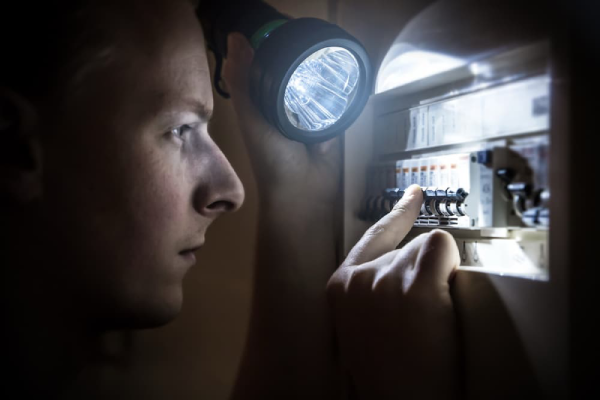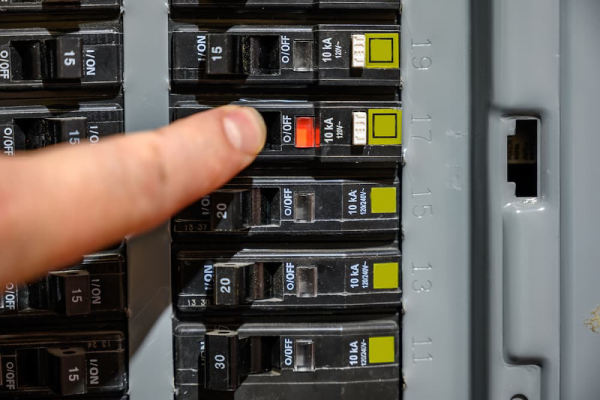
Mr. Electric recommends these steps to identify and resolve if your circuit breaker keeps tripping.
|
Just have a couple of quick questions? Jump to our quick FAQs
A tripped circuit breaker is a common issue homeowners face, and if you haven’t yet upgraded from an outdated fuse box, now’s the time to call Mr. Electric® for assistance. When a circuit breaker trips, it can leave your home or business without power, but the issue is usually easy to solve. But if your breaker keeps tripping, it may signal a more significant problem that requires professional attention. Here’s what you can do to troubleshoot and restore power safely.
What to Do When Your Circuit Breaker Trips
When an electrical surge or overload occurs, the circuit breaker automatically flips to the OFF position to protect your home from damage. Here’s a quick, step-by-step guide to restoring your power:
- Turn Off Affected Appliances and Devices. To ensure no further damage is done when you reset the breaker, start by turning off any electronics or appliances that were affected by the power outage. Unplug devices that don’t have a manual OFF switch.
- Locate Your Circuit Box. Next, go to your circuit box and find the breaker(s) that are switched to the OFF position. Some breakers may be clearly marked with a red or orange color to indicate they are in the OFF state.
- Reset the Breaker. Flip the breaker from OFF to ON. Afterward, gradually turn on the appliances and devices you turned off earlier. If the breaker trips again, it may signal a more serious issue, and it’s time to call a service professional from Mr. Electric.
For more detailed information, be sure to check out our step-by-step guide to What to Do When Your Circuit Breaker Trips.

Does Your Circuit Breaker Keep Tripping?
If your circuit breaker keeps tripping repeatedly, it could be a sign of an underlying issue that requires immediate attention. Common causes of a tripped breaker include:
- Short Circuit. A short circuit occurs when a hot wire comes into contact with a neutral wire, creating a dangerous surge of electricity. The circuit breaker will trip automatically to prevent further damage, such as fires. If this happens, it’s crucial to have a licensed service professional address the wiring issue as soon as possible.
- Overloaded Circuit. An overloaded circuit happens when too many appliances or devices are drawing power from the same circuit. If your circuit can’t handle the load, the breaker will trip to prevent overheating, potential fire hazards, and damage to your electronics. Speak to your trusted electrician about redistributing appliances across different circuits to alleviate the load.
- Ground Fault. A ground fault occurs when a hot wire touches a bare ground wire, sending too much current through the circuit. This surge will trip the breaker, and can even cause damage to outlets or appliances. Ground faults should be repaired immediately by a trusted local service professional to ensure your system is functioning safely.
Troubleshooting Tips for Common Circuit Breaker Issues
If your circuit breaker continues to trip, these troubleshooting tips may help you identify the issue:
Inspect for Water Damage
Moisture in the breaker panel or surrounding wiring can cause shorts and ground faults. Check for any water leaks or signs of moisture near the electrical components and reach out to a service professional to fix the issue promptly.
IMPORTANT: NEVER touch electrical components when they are wet or you are standing on a wet surface.
Check for Overloaded Circuits
If your circuit is overloaded with too many appliances, consider having your licensed electrician move some devices to different circuits to balance the load. Installing additional circuits or upgrading to a larger electrical panel may be necessary to prevent future trips.
Note: Your licensed service professional will inform you if upgrading your breaker box requires a permit per your local building code.
Examine Appliances for Faults
A malfunctioning appliance or device can cause a breaker to trip. Unplug all appliances from the affected circuit, and then plug them in one by one to identify which one might be causing the issue. If you’re comfortable narrowing this down before calling a trusted service professional can allow for faster troubleshooting and efficiently addressing the issue.
Look for Faulty Wiring
Over time, electrical wiring can become damaged or deteriorate, leading to issues such as short circuits and ground faults. If you suspect wiring issues, it’s best to call a licensed electrician for a professional inspection.
Replace an Old Circuit Breaker
If your circuit breaker is old or worn out from frequent tripping, it may need to be replaced. A worn-out breaker may not properly protect your home or appliances, so replacing your circuit breaker is an important safety measure.
Trust Mr. Electric to Solve Your Circuit Breaker Issues
While troubleshooting a tripped breaker can be straightforward, repeated issues or persistent electrical problems require a professional. If your circuit breaker keeps tripping or you’re unsure about the cause, don’t hesitate to contact Mr. Electric. Our experienced service professionals can perform a thorough inspection and provide reliable solutions to keep your home safe and powered—all backed by our Neighborly Done Right Promise®, which ensures your satisfaction. Call your local Mr. Electric service professional today or schedule an appointment to ensure your electrical system is in top condition.
This article is intended for general informational purposes only and may not be applicable to every situation. You are responsible for determining the proper course of action for your home and property. Mr. Electric is not responsible for any damages that occur as a result of this blog content or your actions. For the most accurate guidance, contact the Mr. Electric location nearest you for a comprehensive, on-site assessment.
FAQs About Circuit Breaker Tripping
The safety of your business, customers, and staff are the top priority of every Mr. Electric service professional. Our safety-first commitment to solving your electrical issues includes a meticulous attention to detail on every job. Our commitment also includes using our years of experience to answer your questions. Below are answers to some of the most frequently asked questions about why your circuit breaker keeps tripping.
Why would a breaker keep tripping?
Circuit breakers trip as a safety measure to prevent overheating, electrical fires, and damage to your system. Common causes include overloaded circuits, short circuits, or ground faults. If your breaker keeps tripping repeatedly, contact a licensed electrician to inspect and repair your breaker.
How do I know if my circuit is overloaded?
Signs of an overloaded circuit include flickering lights, buzzing outlets, or a breaker that trips when too many devices are plugged in. To fix this, try redistributing appliances across different circuits or upgrading your home's electrical wiring.
What’s the difference between a short circuit and a ground fault?
A short circuit occurs when a hot wire touches another hot or neutral wire, causing a sudden surge of electricity. A ground fault happens when electricity unintentionally flows to the ground, often due to damaged wiring. Both can cause a breaker to trip and require immediate attention.
Can a bad breaker cause frequent tripping?
Yes! While circuit breakers are designed to trip when necessary, an old or faulty breaker might trip too easily or fail to trip at all. If your breaker is more than 20 years old, it may be time for a circuit breaker upgrade.
Should I reset a tripped breaker myself?
You can safely reset a breaker by switching it fully to the "off" position before turning it back on. However, if it trips again immediately or repeatedly, don’t ignore it—this signals a deeper issue. In this case, a professional inspection is the safest solution.
How can I prevent my circuit breaker from tripping?
Fed up with wondering why your breaker keeps tripping? To reduce tripping, try these steps:
- Avoid plugging too many high-power devices into one circuit.
- Use dedicated electrical circuits for large appliances.
- Upgrade outdated wiring to support modern energy demands.
For long-term prevention, consider consulting a professional electrician.
When should I call a professional for circuit breaker issues?
If your breaker trips frequently, feels hot to the touch, gives off a burning smell, or makes buzzing sounds, call a professional immediately. These can be signs of serious electrical hazards.

